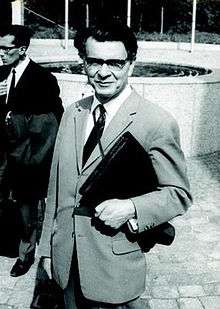Helmut Grunsky
Helmut Grunsky (11 July 1904 – 5 June 1986) was a German mathematician who worked in complex analysis and geometric function theory. He introduced Grunsky's theorem and the Grunsky inequalities.[1]
Helmut Grunsky | |
|---|---|
 Helmut Grunsky in Eichstätt in 1968 | |
| Born | 11 July 1904 |
| Died | 5 June 1986 (aged 81) |
| Nationality | German |
| Alma mater | University of Berlin |
| Known for | Grunsky's theorem Grunsky inequalities |
| Scientific career | |
| Fields | Mathematics |
| Doctoral advisors | Ludwig Bieberbach Issai Schur |
In 1936, he was appointed editor of Jahrbuch über die Fortschritte der Mathematik. In 1939 he was forced to leave this position after Ludwig Bieberbach accused him of employing Jewish referees in a notorious letter.[2] He joined the Nazi Party on 1940 April 1, though he seems to have had little sympathy with its philosophy. He published in the journal Deutsche Mathematik. From 1949 he was Privatdozent at the University of Tübingen; later, he was professor at the University of Mainz and at the University of Würzburg.
Works
- Roth, Oliver; Ruscheweyh, Stephan, eds. (2004), Helmut Grunsky. Collected Papers (in German), Lemgo, Germany: Heldermann Verlag, ISBN 978-3-88538-501-1, MR 2083061(Publishing Announcement)
- Grunsky, Helmut (1978), Lectures on theory of functions in multiply connected domains, Studia mathematica: mathematische Lehrbücher, Göttingen: Vandenhoeck & Ruprecht, ISBN 3-525-40143-4
- Schur, Issai (1968), Grunsky, Helmut (ed.), Vorlesungen über Invariantentheorie, Die Grundlehren der mathematischen Wissenschaften (in German), 143, Berlin, New York: Springer-Verlag, MR 0229674
- Grunsky, Helmut (1939), "Koeffizientenbedingungen für schlicht abbildende meromorphe Funktionen", Mathematische Zeitschrift (in German), 45: 29–61, doi:10.1007/bf01580272
- Grunsky, Helmut (1932), Neue Abschätzungen zur konformen Abbildung ein- und mehrfach zusammenhängender Bereiche, Dissertation Friedrich-Wilhelms-Universität zu Berlin (in German), Schriften des Mathematischen Seminars und des Instituts für angewandte Mathematik der Universität Berlin, Band 1, Heft 4, S. 95–140, Leipzig: B. G. Teubner
Sources
- Roth, Oliver; Ruscheweyh, Stephan, eds. (2004), Helmut Grunsky. Collected Papers (in German), Lemgo, Germany: Heldermann Verlag, ISBN 978-3-88538-501-1, MR 2083061(Publishing Announcement)
- Siegmund-Schultze, Reinhard (2004), "Helmut Grunsky (1904–1986) in the Third Reich: A Mathematician Torn between Conformity and Dissent", in Roth, Oliver; Ruscheweyh, Stephan (eds.), Helmut Grunsky: Collected Papers, Lemgo: Heldermann, pp. XXXI–L, ISBN 978-3-88538-501-1, MR 2083061
- Jenkins, J. A. (1989), "Helmut Grunsky" (PDF), Jahresbericht der Deutschen Mathematiker-Vereinigung, 91 (4): 159–167, ISSN 0012-0456, MR 1027062
Notes
gollark: --userdata set_global bee2 cryoapiary 3.0
gollark: --userdata set bee cryoapiary 2.0
gollark: As planned.
gollark: --userdata get bee
gollark: +<markov <@!509849474647064576> 10
External links
- O'Connor, John J.; Robertson, Edmund F., "Helmut Grunsky", MacTutor History of Mathematics archive, University of St Andrews.
This article is issued from Wikipedia. The text is licensed under Creative Commons - Attribution - Sharealike. Additional terms may apply for the media files.